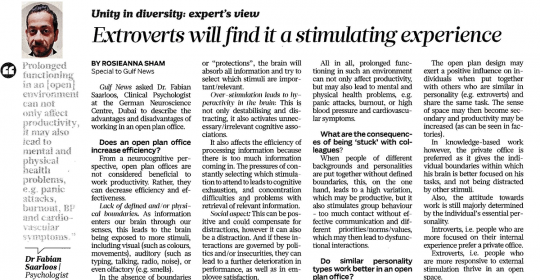
Neuro-Psychological Advantages and Disadvantages of Working in An Open Plan Office
Gulf News asks Dr. Fabian Saarloos, Clinical Psychologist at the German Neuroscience Centre, Dubai to describe the advantages and disadvantages of working in an open plan office.
Does an open plan office increase efficiency?
From a neurocognitive perspective, open plan offices are not considered beneficial to work productivity. Rather, they can decrease efficiency and effectiveness.
Lack of defined and/or physical boundaries. As information enters our brain through our senses, this leads to the brain being exposed to more stimuli, including visual (such as colours, movements), auditory (such as typing, talking, radio, noise), or even olfactory (e.g. smells).
Prolonged functioning in an [open] environment can not only affect productivity, it may also lead to mental and physical health problems, e.g. panic attacks, burnout, BP and cardio-vascular symptoms.
– Dr Fabian Saarloos, Psychologist
In the absence of boundaries or “protections”, the brain will absorb all information and try to select which stimuli are important/relevant.
Over-stimulation leads to hyperactivity in the brain: This is not only destabilising and distracting, it also activates unnecessary/irrelevant cognitive associations.
It also affects the efficiency of processing information because there is too much information coming in. The pressures of constantly selecting which stimulation to attend to leads to cognitive exhaustion, and concentration difficulties and problems with retrieval of relevant information.
Social aspect: This can be positive and could compensate for distractions, however it can also be a distraction. And if these interactions are governed by politics and/or insecurities, they can lead to a further deterioration in performance, as well as in employee satisfaction.
All in all, prolonged functioning in such an environment can not only affect productivity, but may also lead to mental and physical health problems, e.g. panic attacks, burnout, or high blood pressure and cardiovascular symptoms.
What are the consequences of being ‘stuck’ with colleagues?
When people of different backgrounds and personalities are put together without defined boundaries, this, on the one hand, leads to a high variation, which may be productive, but it also stimulates group behaviour – too much contact without effective communication and different priorities/norms/values, which may then lead to dysfunctional interactions.
Do similar personality types work better in an open plan office?
The open plan design may exert a positive influence on individuals when put together with others who are similar in personality (e.g. extroverts) and share the same task. The sense of space may then become secondary and productivity may be increased (as can be seen in factories).
In knowledge-based work however, the private office is preferred as it gives the individual boundaries within which his brain is better focused on his tasks, and not being distracted by other stimuli.
Also, the attitude towards work is still majorly determined by the individual’s essential personality.
Introverts, i.e. people who are more focused on their internal experience prefer a private office.
Extroverts, i.e. people who are more responsive to external stimulation thrive in an open space.
How to deal with the problems of an open office?
• Communication is of the essence: It’s more important than contact. Communication should be open, direct and goal-focused with regards to the message (i.e. the verbal part), but more important is the 70 per cent non-verbal communication.
• Show respect and trust: People should feel respected and trust each other.
• Set clear boundaries: On how to understand the messages of colleagues (e.g. as constructive criticism rather that personal attack), and people should feel safe in the interaction to verbalise their disagreements or take suggestions.
• Have regular team-building activities: Since the concept of open space offices is intended to boost productivity, regular team-building activities are important to monitor the group dynamics and ensure that individuals with same or complementary qualities are aligned and support each other.
The full original article was published in Gulf News

